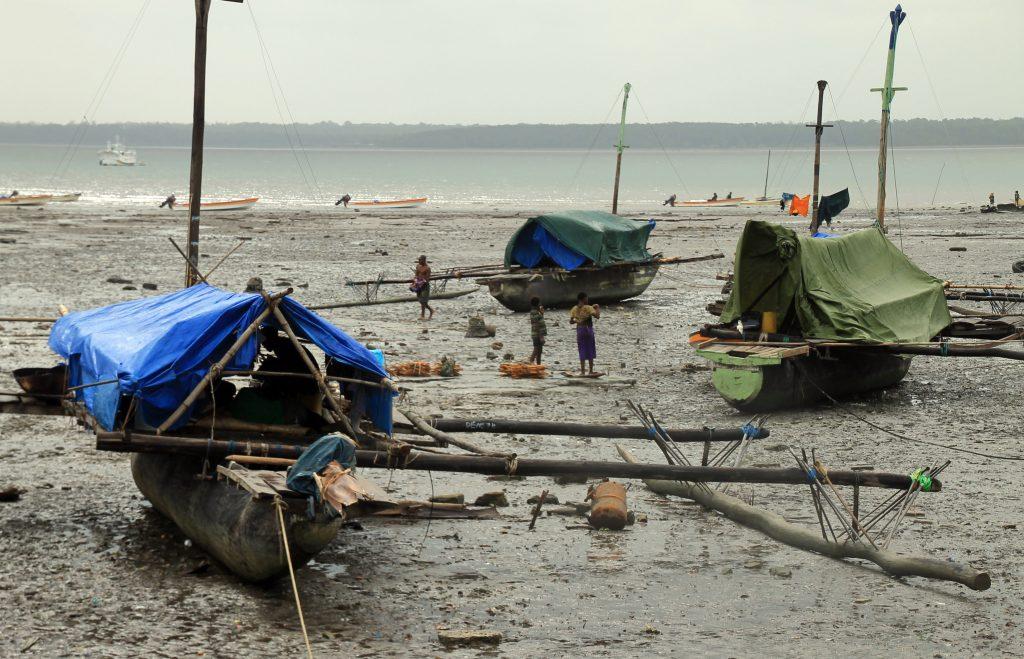
The signing of a $204 million memorandum of understanding between a Chinese government-backed fishery company and the Papua New Guinea government to build a ‘comprehensive multi-functional fishery industrial park’ on the Torres Strait island of Daru has triggered starkly different responses in PNG and in Australia.
Daru is the administrative hub for PNG’s impoverished and underdeveloped Western Province (also known unofficially as Fly River Province). It’s one of the few islands in the Torres Strait that’s not Australian territory, and it’s only a short dinghy ride from the Australian border.
Since I wrote about the MoU in the regional Far North Queensland newspaper Cape and Torres News on 19 and 26 November, and then in The Guardian on 27 November, Jeffery Wall’s 8 December follow-up story in The Strategist triggered multiple reports, all echoing concerns about regional security, depletion of the fishery and a worsening of trade relations with China.
Canberra’s subsequent chest-thumping about Beijing’s ‘big, bad wolf-warrior’ diplomatic tack no doubt had Xi Jinping chuckling.
China’s ambassador to PNG, Xue Bing, said on 12 November that the Daru project ‘will definitely enhance PNG’s ability to comprehensively develop and utilise its own fishery resources’. PNG Fisheries Minister Lino Tom said it was a ‘priority project’.
While China’s record of unsustainable fishing practices is worrying, it’s important to note that this deal is with a PNG government in disarray. It’s only an MoU, many of which fail to evolve into anything concrete, such as the 2016 $5 billion agreement to construct two industrial parks in West Sepik Province.
The Australian National University’s Graeme Smith told the South China Morning Post: ‘An MoU signing ceremony in Papua New Guinea means almost nothing; they’re a dime a dozen.’
I discussed the implications of this deal with traditional inhabitant members of the Torres Strait fishery on the Australian side of the border. They are already suffering from the live-seafood export ban imposed by their biggest customer, China, and are concerned about the proposed development’s impact on their industry, but they are pragmatic about it.
Torres Strait Islanders have long aspired for regional autonomy and more economic independence, and managing their fishery industry is seen as the best way to do that.
Torres Strait community fisheries representative Kenny Bedford told me this week: ‘News of this MoU was always going to ring alarm bells for us.’
But he said another perspective now emerging is the trade opportunity this sort of infrastructure development could represent for the region. It is timely given that a local company, Zenadth Kes Fisheries, has just been established.
‘Finding ways to add value and better market our produce are key objectives of the new entity. This regional development could result in direct trade with China through a much closer port facility’, Bedford said.
Edmund Tamwoy, a Torres Strait fisher from the island of Badu agreed.
‘With all the chaos that’s going on, we might as well deal directly with Daru and I’m open to discussion with the Chinese. If it’s going forward then it’s about us being smarter and seeing how we can tap into it.’
The Australian quoted Foreign Affairs Minister Marise Payne as saying that commercial-scale fisheries would not be considered a traditional activity under the Torres Strait Treaty and would not be permitted. ‘Only residents of the protected zone are able to undertake such activities’, she said.
That is not correct.
Australia and PNG are allowed to fish commercially in the shared area of the waters known as the protected zone, which straddles the fishing zones of the two countries.
As the Australian Fisheries Management Authority website states, inside Australia’s zone, PNG boats may take 25% of the permitted tropical lobster catch and 40% of Spanish mackerel.
To date, PNG has not had the capacity to commercially fish its share of these quotas, but the deal could attract Chinese funding for PNG-flagged vessels that could fish within a couple of kilometres north of Thursday Island. That would be completely legitimate commercial activity that Australia would have no legal right to prevent.
Sources in the Torres Strait tell me there has been no application, yet, for PNG to access its share of the fishery.
When I questioned federal MP for Far North Queensland Warren Entsch, the Australian Fisheries Management Authority, the Australian Border Force, and the Department of Foreign Affairs and Trade about the MoU last month, I got the sense that they had either not been aware of it or not considered its implications.
It took over a week for the government departments to provide me with their similar and carefully crafted responses that all echoed the DFAT line of, ‘We expect all fishers in the Torres Strait region to follow respective Australian and Papua New Guinean laws and international obligations.’
However, a week after the MoU signing, the ABF announced that it had covertly deployed five hydrophones on the ocean floor, ‘across the Torres Strait to combat illegal activity in the region, particularly illegal foreign fishing’.
These underwater microphones are new technology developed with CSIRO that can in real time ‘listen to vessel traffic and behaviour to assist in detecting activity such as illegal fishing and the movements of vessels involved in other illicit activities’, the ABF statement said.
However, all of the commentary to date has avoided the elephant in the room—that there’s been a presumption PNG will remain an underdeveloped backwater indefinitely.
Anyone, including Australian commercial interests, could have cut the same deal with Daru, but in the last four decades of this fledging nation’s history nobody has done that. Now we want to cry wolf-warrior diplomacy at both our neighbour’s aspirations of prosperity and our biggest trading partner’s willingness to facilitate it?
Might Australia have been asleep at the helm in the Torres Strait?